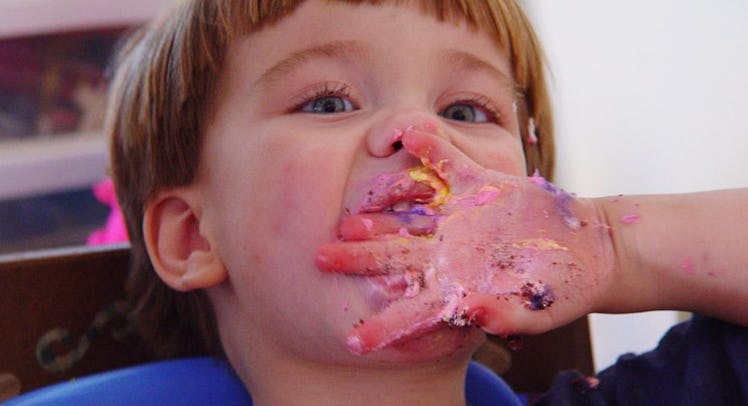The Truth About Your Kid’s Behavior After Eating Sweets
The myth of candy chaos.

Beware of the not-too-distant toddler birthday party. At some point, shortly after the first few hits of candy and a slice airbrushed, grocery-store sheet cake, the children will lose their shit. They will wrestle and carom off the walls. Some will chase each other in shouty, random circles. Others will just stand with their eyes rolled back in their heads, clutching their goody bags, calling out in guttural, unconscious yelps to some god of confections…as if for mercy. Then some mom named Linda, or whatever, will be all: Guess they all have a sugar rush, tee hee.
Eventually, your kid crashes in a puddle of inconsolable tears. You’ll carry them to the car believing sugar turned them into a demon. But did it really? Turns out that answer to how sweets can affect your kid’s behavior is a bit more complex.
Sugar Shock
Does sugar turn your kid into a hyperactive maniac? No. The research is pretty clear that this is a long held parental myth. It’s based more on subjective observation than objective fact. Sorry.
The Journal For The American Medical Association published the biggest study busting the link between sugar and hyperactivity. This double-blind study concluded that sugar had no effect on behavior for the vast majority of children. To which parents said, “But, nuh uh, because Cindy and Johnny nearly killed each other after downing bowls of marshmallow sparkle crunch cereal!” But it turns out going bonkers can be in the eye of the beholder.
Sweet Perspective
Enter another 1994 study from the Journal For Abnormal Child Psychology (read almost exclusively by Stephen King). Researchers found that while sugar did not change behavior, parents who were told their kids had just had sugar believed their children’s behavior to be wilder.
More than that, it’s pretty well documented that the social context sugar inhabits is more likely to be the culprit of the hyperactivity. Birthdays are exciting, loud, boisterous times. And kids feed off each other’s energy. So it makes sense that things could get a little Lord of The Flies-ish.
Curl Up And Food Dye
But hold on a sec. Those sweets don’t just contain sugar. They contain a ton of other stuff. Most notably food dye and other additives. What about those? Well, you might actually have something there.
The Food and Drug Administration (FDA) is responsible for setting the safe threshold for additives like food dyes. But a study from Purdue University which looked into the amount of food dyes consumed by children found that it’s likely they’re getting far more than had been previously imagined.
Why is that a big deal? Because the FDA studied these additives and found that subgroups of children could have food sensitivities to the additives that could result in behavioral changes. According to the FDA, those behavioral changes could include “irritability, fidgetiness, and sleep problems.” Basically, what you get after you watch most horror films.
The Bitter Truth About Sweets
Regardless of whether sugar affects your kid’s behavior (it doesn’t), it’s very clear that it’s not particularly healthy for them. It can lead to a whole host of problems that might dog them into adulthood and doom them to heart disease.
The fact is that it’s up to you to monitor your kid’s sugar intake. But not necessarily because it turns them into a whacko. They’re a kid. They are already a whacko. They don’t need sugar for that.
So the next time a birthday party Mom says something about sugar and hyperactivity, just think smug thoughts, grin and smile. Because even though it would be fun to tell her she’s wrong, you’re sweeter than that.
This article was originally published on